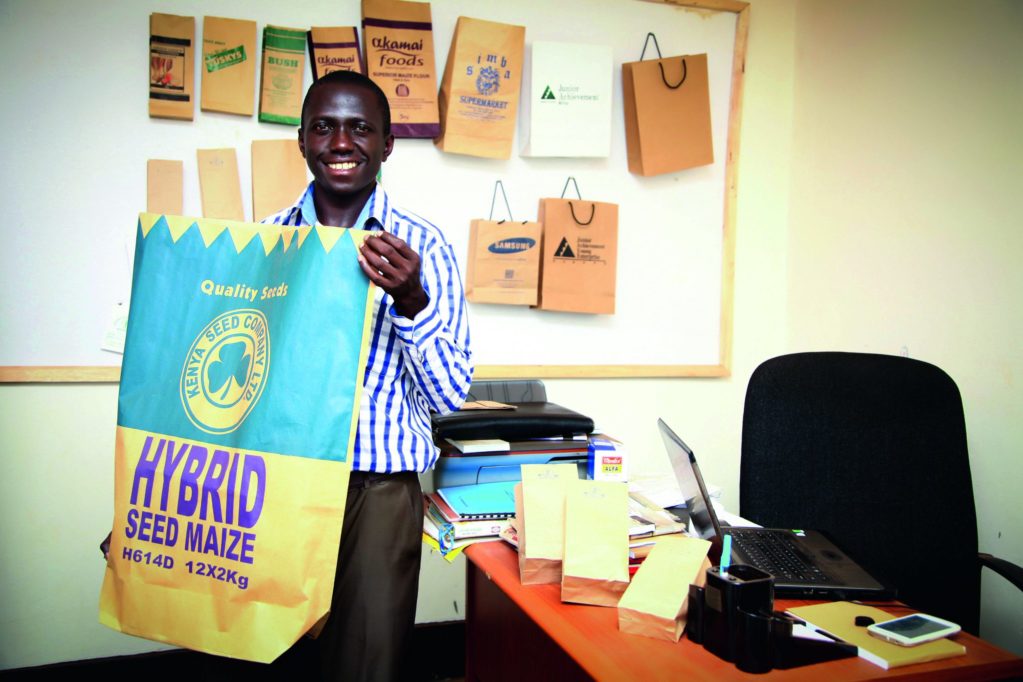Murky rivers are flooded with chemicals; plastic and paper block the drains. Piles of litter are scattered on the ground. Above, colorful plastic bags sweep across the sky. This was the scene as 16-year-old Andrew Mupuya walked to school.
At the time, the secondary school student waking up to the devastating effects of pollution. According to Unicef, almost 2,000 children from around the world die every day from contaminated water. Science Daily reports that air pollution is responsible for more than 2 million deaths every year.

Mupuya often thought of ways in which he could help the environment. He was also looking for an opportunity to support his family and pay his school fees after both his parents lost their jobs. All it took was some initiative from the government and himself.
“In the 2008/2009 financial year budget, the government of Uganda mentioned the intention to ban the polythene bags in the country to promote environmental conservation. Because of this, I began to think of what could replace the polythene bags because they are intensely used,” says Mupuya.
His research showed a great need for the environmentally friendlier paper bags. Unsure of how to start the business, Mupuya sought advice from his entrepreneur teacher who put him in contact with a woman who taught him everything he needed to know about making paper bags by hand. Mupuya sent samples to various clients who were impressed. Demand was high, but Mupuya needed capital.
“I realized there were a lot of used plastic bottles in the community. I collected them and sold them to a plastic recycling plant in Mbuya, located in a Kampala suburb, at 400 Ugandan shillings per kilogram ($1=UGX2,400). I mobilized the school students during their free time to volunteer their time to collect the bottles. We were able to collect 70 kilograms within a period of one week and sold them, making 28,000 Ugandan shillings ($11). This project remained running in the school by its entrepreneurship club. I borrowed 8,000 Ugandan shillings ($3.3) from my teacher to meet the required 36,000 Ugandan shillings ($15).”
Youth Entrepreneurial Link Investments (YELI) started as a one-man business that kept Mupuya busy. He sold the handmade paper bags to retail shops and kiosks, restaurants and roadside sellers. The raw materials were initially sourced from Kampala and later Mupuya imported them from Nairobi, Kenya. He made a profit of 24,000 Ugandan shillings on one ream which would take him three weeks to complete. After employing a few students, he managed to sell one ream in one week.
“Aspiring entrepreneurs should never blame a lack of capital for why they have not yet started a business; capital is your brain. Personally, I started on zero, I created an idea and I later had to think of how to get capital.”
In 2010, YELI became Uganda’s first registered paper bag company.
“It’s an initiative that’s creating change through the youth and impacting them. It’s creating change to me and my community through employability and conserving the environment by providing eco-friendly products.”
Over the years, Mupuya has faced problems handling the large orders and juggling business between classes. The worst was the criticism from peers and teachers who did not believe in his project and often told him he would fail if he didn’t focus on his school work.
Almost five years later, Mupuya, now 22, manages a staff of 16 making 18,000 to 20,000 eco-friendly bags per week, and all of them are made by hand. They cater to 72 clients that range from restaurants, retail shops, supermarkets, medical centers and pharmacies. Some of their larger clients include Maganjo Grain Millers, the biggest flour producing company in East Africa, and Tuskys, one of the biggest supermarkets in Uganda.
YELI has also received great acclaim since launching. In 2012, Mupuya won a $30,000 Anzisha Prize that recognizes young entrepreneurs in Africa. Other awards include a FERD Award for Social Entrepreneurship in 2012, and in 2013 he won Inspire Africa’s innovation prize. Mupuya was also placed on the FORBES 30 Under 30 list in 2013 for young Africans who are helping to change the continent in a positive way.
“My advice to young Africans is, more than ever before, focus on entrepreneurship instead of looking for jobs within multinational companies. Basically, stop looking to be employed for a limited amount of time but rather work for yourself. There is no employment time limit when you work for yourself.”
By 2020, Mupuya would like to see the YELI paper bags manufactured out of a bigger plant that will cater to all countries across the continent. It is his vision is to create a better Africa. One where clean water runs though rivers, plants grow from the nurtured ground and all one sees ar
